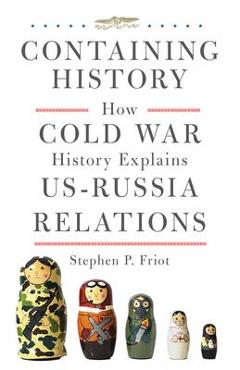Containing History: How Cold War History Explains Us-Russia Relations - Stephen P. Friot

Detalii Containing History: How Cold War
libris.ro
173.35 Lei
216.69 Lei
History
Stephen P. Friot
Containing History: How Cold War - Disponibil la libris.ro
Pe YEO găsești Containing History: How Cold War de la Stephen P. Friot, în categoria History.
Indiferent de nevoile tale, Containing History: How Cold War History Explains Us-Russia Relations - Stephen P. Friot din categoria History îți poate aduce un echilibru perfect între calitate și preț, cu avantaje practice și moderne.
Preț: 173.35 Lei
Caracteristicile produsului Containing History: How Cold War
Comandă Containing History: How Cold War Online, Simplu și Rapid
Prin intermediul platformei YEO, poți comanda Containing History: How Cold War de la libris.ro rapid și în siguranță. Bucură-te de o experiență de cumpărături online optimizată și descoperă cele mai bune oferte actualizate constant.
Descriere magazin:
In the wake of Russia\'s invasion of Ukraine in February 2022, with U.S.-Russia relations approaching a breaking point, this book provides a key to understanding how we got here. Specifically, Stephen P. Friot asks, how do Russians and Americans think about each other, and why do they see the world so differently? The answers, Friot suggests, lie in the historical events surrounding the Cold War and their divergent influence on politics and popular consciousness. Cross-disciplinary and cross-cultural in its scope, Containing History employs the tools and insights of history, political science, and international relations to explain how twenty-first-century public attitudes in Russia are the product of a thousand years of history, including searing experiences in the twentieth century that have no counterparts in U.S. history. At the same time, Friot explores how--in ways incomprehensible to Russians--U.S. politics are driven by American society\'s ethnic and religious diversity and by the robust political competition that often, for better or worse, puts international issues to work in the service of domestic political gain. Looking at history, culture, and politics in both the United States and Russia, Friot shows how the forty-five years of the Cold War and the seventy years of the Soviet era have shaped both the Russia we know in the twenty-first century and American attitudes toward Russia--in ways that drive social and political behavior, with profound consequences for the post-Cold War world. Amid the wreckage of the high hopes that accompanied the end of the Cold War, and as faith in a rules-based international order wanes, Friot\'s work provides a historical, cultural, and political framework for understanding the geopolitics of the moment and, arguably, for navigating a way forward.

Produse asemănătoare
Produse marca Stephen P. Friot

Containing History: How Cold War History Explains Us-Russia Relations - Stephen P. Friot
![]() libris.ro
libris.ro
Actualizat in 25/10/2024
173.35 Lei